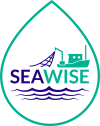
Copyright : Laboratoire LEMAR- 2018
Anna Rindorf (DTU Aqua)
European
H2020 Work Programme BG-10-2020
Start Date
03/04/2025
End Date
03/04/2025
 The SEAwise overall objective is to provide a fully operational approach for European Ecosystem-Based Fisheries Management (EBFM) based on persistent network and co-designed innovation.
SEAwise overcomes the four major challenges by addressing four specific objectives using state of the art risk assessment methodology:
1) Build a network of stakeholders, advisory bodies, decision makers and scientists to co-design key priorities and approaches to EBFM and to ensure SEAwise’s continued impact long after the project period.
2) Assemble a new knowledge base on European fisheries interactions with social and ecological systems that integrates scientist and stakeholder experience based knowledge.
3) Develop predictive models of fisheries interactions with social and ecological systems to evaluate, select
and implement EBFM strategies across Europe accounting for changes in the environment and use of marine space.
4) Provide ready-for-uptake advice for EBFM for Mediterranean, western and northern European waters.
LEMAR is mainly involved in WP3 that aims to construct enhanced predictive models of commercial stock productivity assessing the ecological effects on fisheries yield. Models will benefit from experimental data, obtained by LEMAR participants, on the impact of climate change and pollution on sea bass growth, sex maturation and recruitment.
The SEAwise overall objective is to provide a fully operational approach for European Ecosystem-Based Fisheries Management (EBFM) based on persistent network and co-designed innovation.
SEAwise overcomes the four major challenges by addressing four specific objectives using state of the art risk assessment methodology:
1) Build a network of stakeholders, advisory bodies, decision makers and scientists to co-design key priorities and approaches to EBFM and to ensure SEAwise’s continued impact long after the project period.
2) Assemble a new knowledge base on European fisheries interactions with social and ecological systems that integrates scientist and stakeholder experience based knowledge.
3) Develop predictive models of fisheries interactions with social and ecological systems to evaluate, select
and implement EBFM strategies across Europe accounting for changes in the environment and use of marine space.
4) Provide ready-for-uptake advice for EBFM for Mediterranean, western and northern European waters.
LEMAR is mainly involved in WP3 that aims to construct enhanced predictive models of commercial stock productivity assessing the ecological effects on fisheries yield. Models will benefit from experimental data, obtained by LEMAR participants, on the impact of climate change and pollution on sea bass growth, sex maturation and recruitment.

 © Bernard DUPONTBIOMAS
Scroll to top
© Bernard DUPONTBIOMAS
Scroll to top